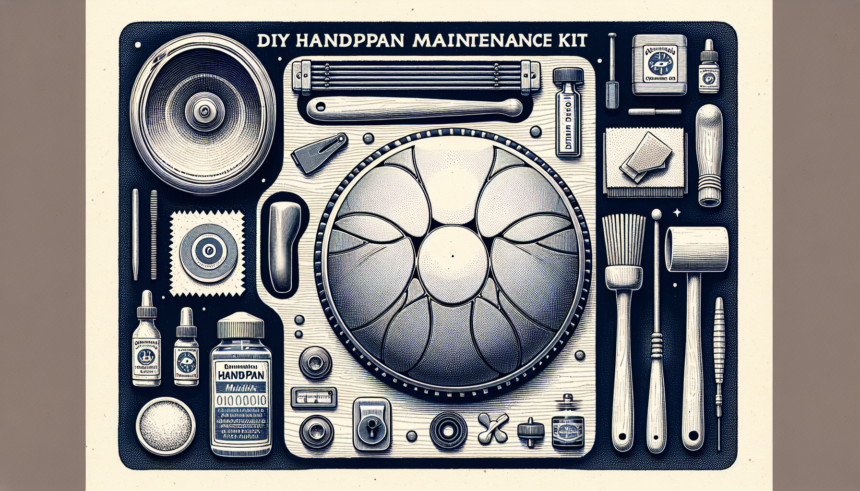<!DOCTYPE html>
<html lang="en">
<head>
<meta charset="UTF-8">
<meta name="viewport" content="width=device-width, initial-scale=1.0">
<title>DIY Handpan Maintenance Kit</title>
</head>
<body>
<h1>DIY Handpan Maintenance Kit: A Step-by-Step Guide</h1>
<p>The handpan is a magnificent musical instrument known for its ethereal soundscapes and unique resonance. Like any precious instrument, maintaining a handpan is crucial to preserve its sound quality and prolong its lifespan. With the right tools and a little know-how, you can keep your handpan in top-notch condition. This step-by-step guide will help you assemble a DIY handpan maintenance kit and provide you with the knowledge needed to maintain your handpan properly.</p>
<h2>Items You Need for Your DIY Handpan Maintenance Kit</h2>
<p>Before diving into the maintenance process, you need to gather the essential items required for a comprehensive handpan maintenance kit. Here’s a list of must-have items:</p>
<ul>
<li><strong>Microfiber Cloths:</strong> For cleaning and polishing the surface of the handpan without causing scratches.</li>
<li><strong>Rubber Gloves:</strong> To protect your hands from oils and cleaning agents.</li>
<li><strong>Isopropyl Alcohol (70% to 90%):</strong> For removing stubborn stains and disinfecting the surface.</li>
<li><strong>Coconut Oil or Linseed Oil:</strong> To help with rust prevention and provide a protective coating.</li>
<li><strong>Rust Remover:</strong> For tackling any rust spots that may develop over time.</li>
<li><strong>Soft Brushes:</strong> To gently clean the nooks and crannies of the handpan.</li>
<li><strong>Silica Gel Packets:</strong> To control humidity and prevent moisture buildup.</li>
<li><strong>Storage Bag or Case:</strong> To protect your handpan from physical damage when not in use.</li>
</ul>
<h2>Step-by-Step Guide to Handpan Maintenance</h2>
<h3>1. Initial Inspection</h3>
<p>Before starting the maintenance process, inspect your handpan carefully under good lighting. Look for any signs of rust, discoloration, or dust buildup.</p>
<h3>2. Cleaning the Surface</h3>
<h4>Using a Microfiber Cloth</h4>
<p>Begin by wiping the surface with a dry microfiber cloth. This will remove any loose dust and particles. Do this gently to avoid scratching the surface.</p>
<h4>Using Isopropyl Alcohol</h4>
<p>If there are stubborn stains or fingerprints, dampen a microfiber cloth with isopropyl alcohol and gently clean the areas. Isopropyl alcohol effectively breaks down oils and residues without damaging the handpan’s surface.</p>
<h3>3. Treating Rust Spots</h3>
<p>If you notice any rust spots during your inspection, it's vital to address them promptly.</p>
<h4>Applying Rust Remover</h4>
<p>Use a rust remover specifically designed for musical instruments. Apply a small amount of rust remover to the rust spot and let it sit for the recommended time as per the product instructions. Gently scrub the area with a soft brush and then wipe clean with a microfiber cloth.</p>
<h3>4. Preventing Rust</h3>
<p>Preventative measures are essential to keep rust away. Applying a protective layer of oil can provide a barrier against moisture.</p>
<h4>Using Coconut or Linseed Oil</h4>
<p>Apply a small amount of coconut or linseed oil to a clean microfiber cloth. Rub the oil gently onto the surface of the handpan, covering all areas evenly. Allow the oil to sit for a few minutes and then buff the surface with a dry microfiber cloth to remove any excess oil.</p>
<h3>5. Handling and Storage</h3>
<h4>Using Rubber Gloves</h4>
<p>Always handle your handpan with clean hands or wear rubber gloves to prevent transferring oils and dirt from your hands onto the instrument.</p>
<h4>Using Silica Gel Packets</h4>
<p>Place silica gel packets inside your handpan case or storage bag to control humidity levels and prevent moisture buildup. Replace them regularly to ensure they remain effective.</p>
<h3>6. Regular Maintenance</h3>
<p>Setting a routine for regular maintenance can help keep your handpan in pristine condition.</p>
<h4>Weekly Checks</h4>
<p>Perform a quick inspection and light cleaning of your handpan every week to catch any issues early.</p>
<h4>Monthly Deep Cleaning</h4>
<p>Once a month, perform a deep cleaning session following the steps outlined above. This should include a thorough wipe-down with isopropyl alcohol and reapplying the oil coating.</p>
<h2>Additional Tips for Handpan Care</h2>
<ul>
<li><strong>Avoid Drastic Temperature Changes:</strong> Keep your handpan away from extreme temperatures as they can cause the metal to expand or contract, potentially leading to detuning.</li>
<li><strong>Handle with Care:</strong> Always transport your handpan in a padded case to prevent dents and scratches.</li>
<li><strong>Avoid Harsh Chemicals:</strong> Do not use harsh chemicals or abrasive cleaning tools on your handpan as they can damage the surface and sound quality.</li>
<li><strong>Play Responsibly:</strong> When playing, strike the handpan gently. Overly aggressive playing can deform the metal and alter its sound.</li>
</ul>
<h2>Conclusion</h2>
<p>Proper maintenance of your handpan is essential to ensure its longevity and continuous pristine sound quality. By taking the time to assemble a DIY maintenance kit and following these detailed steps, you can keep your handpan in excellent condition. Regular inspections, cleaning, and protective measures can prevent problems before they escalate, ultimately preserving the beautiful sounds of your handpan for years to come.</p>
<h2>Frequently Asked Questions (FAQs)</h2>
<h3>1. How often should I clean my handpan?</h3>
<p>It's recommended to perform a light cleaning every week and a deep cleaning once a month. Regular maintenance prevents the buildup of dirt and rust that can affect the handpan’s sound quality.</p>
<h3>2. Can I use any oil for rust prevention on my handpan?</h3>
<p>It's best to use coconut oil or linseed oil as they are less likely to harm the surface of the handpan. Avoid using any aggressive oils that could potentially damage the metal.</p>
<h3>3. What should I do if my handpan gets wet?</h3>
<p>If your handpan gets wet, dry it immediately with a microfiber cloth. Apply a thin layer of oil to prevent rust from forming. Make sure to store it in a dry place with silica gel packets to control moisture.</p>
<h3>4. Are there any specific storage conditions for a handpan?</h3>
<p>Your handpan should be stored in a cool, dry place away from direct sunlight and extreme temperatures. Always use a padded storage bag or case for additional protection.</p>
<h3>5. How can I prevent my handpan from detuning?</h3>
<p>Avoid extreme temperature changes, handle the instrument gently, and store it properly to prevent physical damage. Regular maintenance and gentle playing can also help in maintaining its tune.</p>
</body>
</html>DIY Handpan Maintenance Kit: A Step-by-Step Guide

Leave a comment




